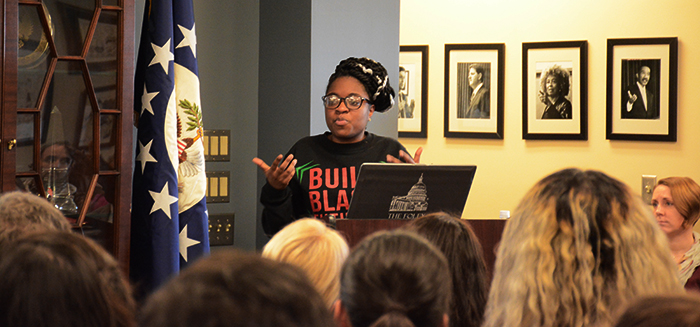Change the system, not the candidate
HARRINA HWANG | Daily Evergreen file
Charlene Carruthers speaks at Coffee and Politics before her keynote address for the MLK, Jr. Community Celebration on Jan. 26.
February 14, 2017
Charlene Carruthers gave a phenomenal speech last week at the Martin Luther King, Jr. community celebration.
The black queer feminist and organizer passionately spoke about movement building and organizing against social injustice.
Her adamancy that these topics should be studied through national, global and diasporic contexts is, perhaps, what stuck with me the most from her speech and my personal conversation with her.
Furthermore, when examining social and political solutions, our general attitude in the States is to try to elect a person rather than rallying behind a call to address actual social policies and social issues.
“Engaging around issues and concerns rather than candidates and political parties,” Carruthers said, is one of the focuses of the Black Youth Project 100 organization that she directs.
We, as a nation, undergo a whole year of election season in efforts to elect one person. Before, during and after that election season, we neglect vast amounts of concerns that the poorest and most underrepresented Americans have.
Our concerns do not disappear when a new candidate is placed in office, unless that candidate directly represents us, which is rare.
We need to think more broadly about how we can aim for a system where people’s wellbeing isn’t dependent on the current candidate in office.
Contrary to some beliefs, the word minority is not an indication of inferiority, but an indication of the amount of power a person or group has in a given society. In turn, this means that in any election, minorities will not have the loudest voice, members of the dominant society will. As a result, issues and concerns of underrepresented people are placed on the back burners of our nation’s agenda. Even when marginalized groups rally around a candidate that expresses concern for their issues, they often don’t have the power of numbers.
Since the concerns of marginalized groups don’t affect the dominant groups, dominant society is less likely to elect a candidate that is adequately concerned with the affairs of people of color, LGBTQ, persons with disabilities, etc.
This phenomenon is evident in the past election season, with the election of a bigot.
As Carruthers explained in her speech, many of the fears that people have regarding this current administration are issues that minority communities have been struggling with for years under previous administrations.
For example, issues surrounding police brutality and racial bias against black and brown people occurred under the first black president. The same president who promised underrepresented people access and security deported more immigrants than any other president before, according to a report by ABC news.
This goes to show that rallying behind a specific candidate and spending our energy to get one elected may not be the best route to social reform.
What would be a better use of our time is examining the fundamental social issues that exist, while reforming our social structures and institutions to mirror equality for all people.
Perhaps it’s time to think less about electing the “right” candidate and more about creating the right political system that would provide each American’s concern a space on the national agenda.
Basheera Agyeman is a junior comparative ethnic studies major from Accra, Ghana. She can be contacted at 335-2290 or by [email protected]. The opinions expressed in this column are not necessarily those of the staff of The Daily Evergreen or those of The Office of Student Media.

















